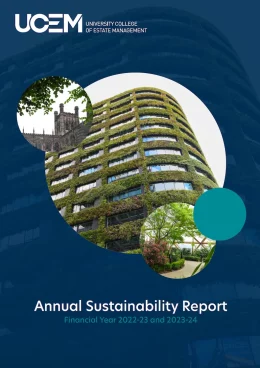 Download
Download
UCEM Sustainability Annual Report
Financial Year 2022-23 and 2023-24
Our ambition is for sustainability to become synonymous with who we are and for UCEM to be regarded as a true global leader.
This year has seen the successful accreditation and launch of new sustainability-focused programmes such as the MSc Innovation in Sustainable Built Environments, as well as new professional training materials needed to upskill built environment professionals. UCEM’s focus on excellent sustainability education has been recognised via the King’s Foundation Partnership of the Year award, demonstrating how the institution has gone “above and beyond” in our research and provision of educational resources.
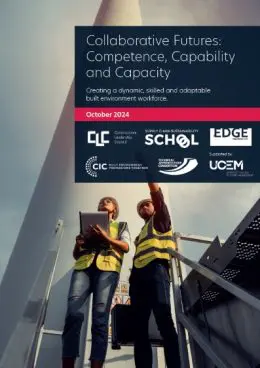 Download
Download
Collaborative Futures: Competence, Capability and Capacity
The ‘Collaborative Futures: Competence, Capability & Capacity’ report captures the key discussions and insights from UCEM’s similarly titled ‘INSPIRE’ event, which convened leaders, educators and workforce experts from across the built environment.
The report explores the cooperative efforts required to address the sector’s current skills challenges, including workforce skills gaps, competence standards and utilising new technologies.
Serving as a roadmap for building a skilled, resilient and adaptable workforce, it highlights strategic priorities such as fostering cross-sector coordination, creating inclusive talent pathways and enhancing professional & technical qualifications. It also examines the role of digitalisation and AI in upskilling the workforce and promoting sustainable practices.
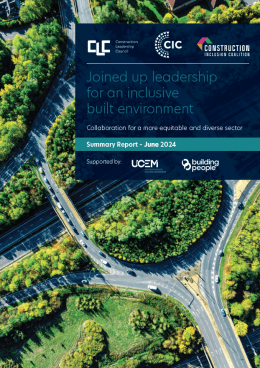 Download
Download
Joined up leadership for an inclusive built environment: Collaboration for a more equitable and diverse sector
‘Joined Up Leadership for an Inclusive Built Environment’ encapsulates the insights and collaborative efforts needed to foster equity, diversity and inclusion within the built environment. It draws on the collective wisdom of experts across construction, real estate and related sectors, who convened at a UCEM-hosted event to tackle the pressing challenges of attracting, retaining and nurturing diverse talent.
Highlighting key initiatives, such as the impactful collaboration of professional bodies and strategic recommendations for sector-wide improvement, the report underscores the importance of unified action and leadership. It aims to guide the built environment towards a more inclusive future, emphasising collaborative action and shared commitment as catalysts for lasting change.
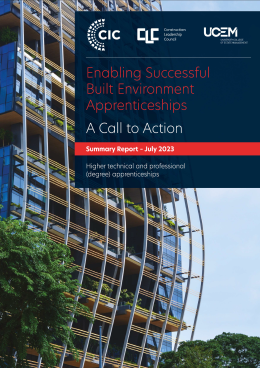 Download
Download
Enabling Successful Built Environment Apprenticeships: A Call to Action
‘Enabling Successful Built Environment Apprenticeships: A Call to Action’, published by UCEM in partnership with the Construction Industry Council and the Construction Leadership Council recommends reforms to increase the retention, continuation and success of built environment apprenticeships, especially at higher technical and professional levels.
Apprenticeships have emerged as a key avenue for bringing people into technical and professional roles in the built environment. However, the report identifies some barriers to these types of apprenticeships which need to be overcome if we are to prepare the built environment professionals of tomorrow with the competencies that will deliver enhanced building safety standards, net-zero, sustainability and digital transformation.
The report also highlights how sectoral collaboration and partnerships are critical to attracting and retaining the right people in construction and the built environment, via the right apprenticeships, the right training providers and end point assessment processes, at the right time.
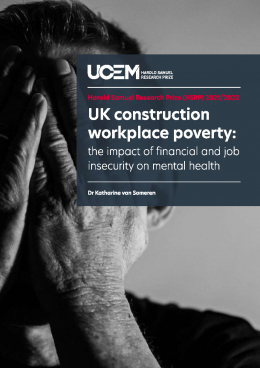 Download
Download
UK Construction Workplace Poverty: The Impact Of Financial And Job Insecurity On Mental Health
The aim of this study was to explore resilience and wellbeing in the UK construction sector, specifically looking at mental health in construction and how this is affected by financial wellbeing and job security. Mental health is of paramount importance; it impacts on how we feel, think, and behave each day. Mental health contributes to decision making and problem solving, and therefore impacts professionally and can have profound effects on the individual, family, friends and work.
 Download
Download
PropTech Education Integration Framework (PEIF)
October 2021
The accelerated growth of digitisation in real estate operations and practice has led to the emergence of a contemporary real estate specialist area commonly referred to as “PropTech”. Despite the tremendous growth in the deployment of digital technologies and IT systems to solve real estate problems, there has been a disproportionate growth in scholarly work, particularly in PropTech education.
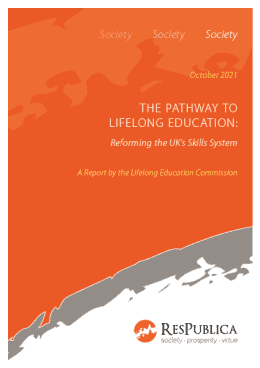 Download
Download
The Pathway to Lifelong Education: Reforming the UK’s Skills System
October 2021
This research report by public policy thinktank, ResPublica’s Lifelong Education Commission assesses the barriers to lifelong learning in England.
Chaired by former universities minister, Chris Skidmore MP, the hope is that the report will prompt the government to make changes to existing mechanisms to allow lifelong learning to flourish.
UCEM Principal, Ashley Wheaton, contributed his expertise to the report and shared his comments on the report in an article on the UCEM website.
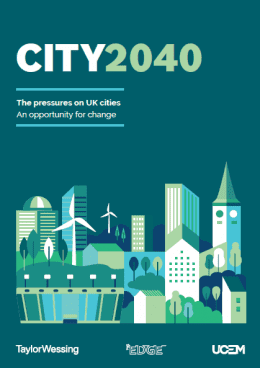 Download
Download
City 2040. The pressures on UK cities: An opportunity for change
July 2021
City 2040 proposes how UK cities need to change post-pandemic enabling the real estate industry to flourish over the next 20 years, and use these changes to benefit both the environment and the wellbeing of people.
Key elements of this vision include adapting single city centres to broaden their appeal, and the addition of smaller hubs within a city’s bounds. This will create more localised areas with unique identities and more widely accessible urban green space, all of which will benefit the environment.
The research, released by international law firm, Taylor Wessing, together with think tank, the Edge, and UCEM, harnesses ideas offered by 600 academics and experts drawing conclusions and new solutions for industry professionals to consider.
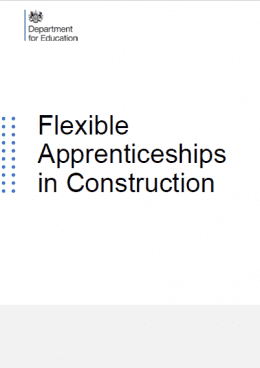 Download
Download
Flexible Apprenticeships in Construction
This manual, co-authored by industry and government, sets out how flexibilities in apprenticeships can be used and delivered in construction – to meet the needs of employers and apprentices.
Apprenticeships have been on a transformational journey since 2012, with reforms such as the introduction of employer-led standards leading the way in ensuring apprenticeships are relevant, high quality, and meet the skills needs of employers.
In 2020, the Prime Minister committed to building on this success, and making apprenticeships more flexible, to better meet the needs of employers and apprentices.
The manual sets out how the delivery of apprenticeship training can be flexed to meet employer needs and how the length of an apprenticeship can be reduced where an individual has existing relevant knowledge or skills.
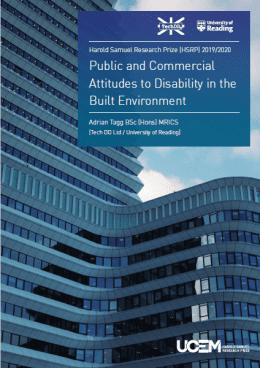 Download
Download
Public and Commercial Attitudes to Disability in the Built Environment
Showcasing ‘gold’ standards on inclusive design is critical to illustrate the commercial and social benefits of increased accessibility in the Built Environment for disabled people. Commercial value and consumer choice are two reasons why building owners or service providers should look beyond minimal legal compliance towards the commercial opportunities that an inclusive environment engenders. These are the headline recommendations in a new research report by Adrian Tagg, funded by University College of Estate Management’s (UCEM) Harold Samuel Research Prize, titled ‘Public and commercial attitudes to disability in the built environment’.
 Download
Download
Build back better: Improving the apprenticeship system to better support infrastructure
October 2020
High skill, high tech construction apprenticeships are needed to boost the skills needed in infrastructure projects to drive the UK’s economic recovery. This is what is being called for by the authors of a new research report entitled ‘Build back better: Improving the apprenticeship system to better support infrastructure’.
The report, written on behalf of the Construction Industry Council (CIC), University College of Estate Management (UCEM) and the Technical Apprenticeship Consortium (TAC), with data used from a CIC survey of employers, recommends that Government works with CIC, employers and the professional bodies to: recognise the value of technical and higher-level apprenticeships leading to professional registration; increase the flexibility of the apprenticeship levy; join up and improve the apprenticeship systems across the UK; and celebrate and promote apprenticeships.
 Download
Download
The role of standards in enabling a data driven UK real estate market
September 2020


